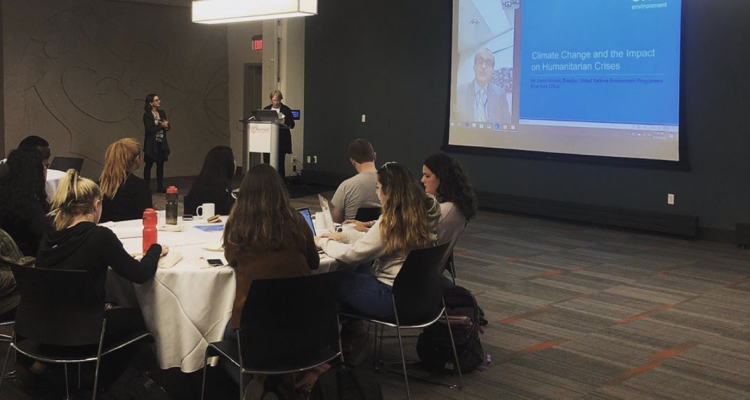Students of Fairfield University, including members of Jesuit Universities Humanitarian Action Network left the Dogwood Room in the John A. Barone Campus Center Monday night with a bag of reusable utensils and the facts to fight climate change.
Dr. Jamil Ahmad, United Nations Environmental Programme director, was invited by Julie Mughal, the associate director for Humanitarian Action, to speak to Fairfield University students about climate change and how it impacts humanitarian crises.
“Preventing irreversible climate disruption is the race of our lives and for our lives,” Ahmad said, quoting the words of UN Secretary-General António Guterres.
Ahmad identified the current challenges that the world faces due to climate change, including biodiversity loss making land more vulnerable to natural disasters, a problem which equates to a global $520 billion loss annually.
“Areas with less infrastructure and public resources will be the least able to prepare, respond and recover,” he explained.
Environmental factors such as floods, hurricanes, sea level rise, salinization of water, droughts and desertification contribute to forced displacement and migration. In 2017, there were 30.6 million new displacements across 143 countries due to natural disasters and conflict, he said.
Senior Priscila Roman, co-president of JUHAN, admitted that it is hard to realize the effects of climate change in environments like a college campus.
“We can’t see it right now because we are so comfortable in our little bubble. Fairfield is so nice, but this is just a small percentage of the entire world and what’s going on . . . so many refugees, so many displaced people. This is a huge problem,” she said.
In the last half of the presentation, Ahmad began to discuss solutions determined by UNEP, the leading authority that sets the global environmental agenda.
In 2013, UNEP launched a three-year project in partnership with the European Union, the Darfur Regional Authority and the Government of Darfur to promote sustainable land use and water resources management in the Wadi El Ku catchment area. By 2017, the project had impacted 81,000 residents.
Many students want to make a positive impact on the environment, but feel anxious, discouraged and worried that their contribution cannot compare to what authorities such as UNEP are capable of changing.
According to Janie L. Leatherman PhD, director for Humanitarian Action at Fairfield University, her students feel that there is too much talk and not enough action against climate change. But Ahmad saw some hope, even in that anxiety.
“If we feel anxious, that is good. It shows that we feel for others. If we don’t feel the pain of other human beings, we should not call ourselves human beings,” Ahmad said.
In a collective effort to combat climate change he suggested that students and staff begin with themselves. As individuals, we can choose to lesson our carbon footprint by conserving energy. We can also work together to spread this message across class, campus and at home by for example, ending our use of single-use plastics. Plastic is one of the greatest threats to the environment, Ahmad said, noting that it is estimated that more plastic than fish will populate the ocean by the year 2030.
Roman carries around a collection of reusable utensils and a metal straw in her backpack to avoid using plastic utensils. She tries to walk or bike from location to location to conserve nitrogen oxides emitted from car exhaust. She also saves energy by turning the lights off and unplugging cords when she leaves the room.
“It’s really a part of the apostalic preferences, so it’s very Jesuit [in terms of] men and women for others, care for our global earth. I think that this generation of students are going to do a great job turning things around,” said Mughal.
Ahmad is hopeful about the movement against climate change. Looking back 30 years ago, he said, climate change was not discussed. Now action is being taken. It may be slow, but there is still time.


Leave a Reply